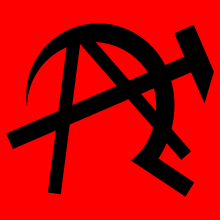List of political ideologies
This article may contain unverified or indiscriminate information in embedded lists. (December 2023) |
| Part of the Politics series |
| Party politics |
|---|
|
|
| Part of the Politics series |
| Basic forms of government |
|---|
| List of forms · List of countries |
|
|
| Part of a series on |
| Economic systems |
|---|
|
Major types
|
In political science, a political ideology is a certain set of ethical ideals, principles, doctrines, myths or symbols of a social movement, institution, class or large group that explains how society should work and offers some political and cultural blueprint for a certain social order. A political ideology largely concerns itself with how to allocate power and to what ends it should be used. Some political parties follow a certain ideology very closely while others may take broad inspiration from a group of related ideologies without specifically embracing any one of them. An ideology's popularity is partly due to the influence of moral entrepreneurs, who sometimes act in their own interests. Political ideologies have two dimensions: (1) goals: how society should be organized; and (2) methods: the most appropriate way to achieve this goal.
An ideology is a collection of ideas. Typically, each ideology contains certain ideas on what it considers to be the best form of government (e.g. autocracy or democracy) and the best economic system (e.g. capitalism or socialism). The same word is sometimes used to identify both an ideology and one of its main ideas. For instance, socialism may refer to an economic system, or it may refer to an ideology that supports that economic system. The same term may also refer to multiple ideologies, which is why political scientists try to find consensus definitions for these terms. For example, while the terms have been conflated at times, communism has come in common parlance and in academics to refer to Soviet-type regimes and Marxist–Leninist ideologies, whereas socialism has come to refer to a wider range of differing ideologies which are most often distinct from Marxism–Leninism.[1]
Political ideology is a term fraught with problems, having been called "the most elusive concept in the whole of social science".[2] While ideologies tend to identify themselves by their position on the political spectrum (such as the left, the centre or the right), they can be distinguished from political strategies (e.g. populism as it is commonly defined) and from single issues around which a party may be built (e.g. civil libertarianism and support or opposition to European integration), although either of these may or may not be central to a particular ideology. Several studies show that political ideology is heritable within families.[3][4][5][6][7]
The following list is strictly alphabetical and attempts to divide the ideologies found in practical political life into several groups, with each group containing ideologies that are related to each other. The headers refer to the names of the best-known ideologies in each group. The names of the headers do not necessarily imply some hierarchical order or that one ideology evolved out of the other. Instead, they are merely noting that the ideologies in question are practically, historically, and ideologically related to each other. As such, one ideology can belong to several groups and there is sometimes considerable overlap between related ideologies. The meaning of a political label can also differ between countries and political parties often subscribe to a combination of ideologies.
Anarchism
[edit]| Part of a series on |
| Anarchism |
|---|
 |

- Political internationals
- Anarkismo (platformism and specifism)
- Informal Anarchist Federation (insurrectionary anarchism)
- International of Anarchist Federations (synthesis anarchism)
- International Confederation of Labor (anarcho-syndicalism and revolutionary syndicalism)
- International Workers' Association (anarcho-syndicalism)
Classical
[edit]Post-classical
[edit]Contemporary
[edit]Opposition
[edit]Religious variants
[edit]Regional variants
[edit]African
[edit]American
[edit]Asian
[edit]European
[edit]Oceanian
[edit]Authoritarianism
[edit]General
[edit]Other
[edit]Opposition
[edit]Religious variants
[edit]Regional variants
[edit]African
[edit]American
[edit]Asian
[edit]European
[edit]Communitarianism
[edit]| Part of the Politics series on |
| Communitarianism |
|---|
| Politics portal |
General
[edit]Other
[edit]Regional variants
[edit]Communism
[edit]| Part of a series on |
| Communism |
|---|
 |
|
|

- Political internationals
- Committee for a Workers' International (Trotskyism)
- Coordinating Committee for the Refoundation of the Fourth International (Trotskyism)
- Fourth International (Trotskyism)
- Fourth International (post-reunification) (Trotskyism)
- Fourth International Posadist (Trotskyism)
- International Bolshevik Tendency (Trotskyism)
- International Committee of the Fourth International (Trotskyism)
- International Communist Current (left communism)
- International Communist League (Fourth Internationalist) (Trotskyism)
- International Communist Party (left communism)
- International Conference of Marxist–Leninist Parties and Organizations (International Newsletter) (Maoism)
- International Conference of Marxist–Leninist Parties and Organizations (Unity & Struggle) (Hoxhaism)
- International Coordination of Revolutionary Parties and Organizations (anti-revisionism)
- International League of Peoples' Struggle (Marxism–Leninism–Maoism)
- International Meeting of Communist and Workers Parties (Marxism–Leninism)
- International Socialist Alternative (Trotskyism)
- International Socialist Tendency (unorthodox Trotskyism)
- International Workers League – Fourth International (Trotskyism)
- Internationalist Communist Union (Trotskyism)
- League for the Fifth International (Trotskyism)
- League for the Fourth International (Trotskyism)
- Trotskyist Fraction – Fourth International (Trotskyism)
- World Socialist Movement (anti-Leninism, classical Marxism, impossibilism and international socialism)
- Workers International to Rebuild the Fourth International (Trotskyism)
Authoritarian
[edit]| Part of a series on |
| Marxism–Leninism |
|---|
 |
Leninism
[edit]Marxism–Leninism
[edit]- Brezhnevism
- Castroism
- Ceaușism
- Dubčekism
- Gorbachevism
- Guevarism
- Ho Chi Minh Thought
- Hoxhaism
- Husakism
- Juche
- Kadarism
- Khrushchevism
- Maoism
- Marxist–Leninist atheism
- Scientific communism
- Stalinism
- Titoism
Libertarian
[edit]| Part of a series on |
| Anarchist communism |
|---|
 |

Marxism
[edit]Other
[edit]Opposition
[edit]Religious variants
[edit]Regional variants
[edit]African
[edit]American
[edit]Asian
[edit]European
[edit]- Albania
- Bosnia, and Herzegovina
- Bulgaria
- Belarus
- Croatia
- Cyprus
- Czechoslovakia
- Estonia
- Finland
- France
- Germany
- Greece
- Hungary
- Italy
- Latvia
- Lithuania
- Macedonia
- Moldova
- Montenegro
- Poland
- Portugal
- Romania
- Russia
- Serbia
- Slovenia
- Spain
- Ukraine
- United Kingdom
- Yugoslavia
Oceanian
[edit]Conservatism
[edit]| Part of a series on |
| Conservatism |
|---|
 |
- Political internationals
- International Democrat Union (conservatism)
- International Monarchist League (monarchism)
General
[edit]- Anti-unionism
- Authoritarian conservatism
- Bioconservatism
- Black conservatism
- Civic conservatism
- Classical conservatism
- Conservative corporatism
- Conservative liberalism
- Cultural conservatism
- Fiscal conservatism
- Green conservatism
- LGBT conservatism
- Liberal conservatism
- Libertarian conservatism
- National conservatism
- Neoconservatism
- Paleoconservatism
- Paternalistic conservatism
- Right-wing populism
- Social conservatism
- Social Darwinism
- Theoconservatism
- Traditionalist conservatism
Reactionary
[edit]Opposition
[edit]Religious variants
[edit]Regional variants
[edit]African
[edit]American
[edit]| This article is part of a series on |
| Conservatism in Canada |
|---|
 |
| This article is part of a series on |
| Conservatism in the United States |
|---|
 |
United States
[edit]Asian
[edit]European
[edit]| Part of the Politics series on |
| Toryism |
|---|
 |
Oceanian
[edit]Corporatism
[edit]| Corporatism |
|---|
 |
General
[edit]Other
[edit]Religious variants
[edit]Regional variants
[edit]Western Europe
[edit]Democracy
[edit]| Part of the Politics series |
| Democracy |
|---|
|
|


General
[edit]- Associative democracy
- Bioregional democracy
- Bourgeois democracy
- Cellular democracy
- Conservative democracy
- Constitutional democracy
- Cosmopolitan democracy
- Defensive democracy
- Economic democracy
- E-democracy
- Ethnic democracy
- Guided democracy
- Liquid democracy
- Market democracy
- Media democracy
- Multiparty democracy
- Non-partisan democracy
- Participatory democracy
- Pluralist democracy
- Procedural democracy
- Proletarian democracy
- Racial democracy
- Radical democracy
- Representative democracy
- Republican democracy
- Revolutionary democracy
- Sectarian democracy
- Semi-democracy
- Semi-direct democracy
- Social democracy
- Socialist democracy
- Sovereign democracy
- Substantive democracy
- Tory democracy
Other
[edit]Direct democracy movements
[edit]- Anticipatory democracy
- Anti-corruption movements
- Anti-establishmentarianism
- Anti-particracy movements
- Cellular democracy
- Collaborative governance
- Consensus democracy
- Copyright reform movements
- Council democracy
- Cyber-utopianism
- Deliberative democracy
- Delegative democracy
- Dynamic governance
- E-democracy
- Economic democracy
- Empowered democracy
- Grassroots democracy
- Inclusive Democracy
- Localism
- Marxist democracy
- Net neutrality movements
- Open-source governance
- Pirate politics
- Popular democracy
- Producerism
- Semi-direct democracy
Pirate politics
[edit]Pirate politics | |
|---|---|
 | |
| Ideology | Anti-corruption Civil libertarianism Civil rights Direct democracy E-democracy Participatory democracy Social liberalism |
- Political internationals
Opposition
[edit]Religious variants
[edit]Christian democracy
[edit]| Part of a series on |
| Christian democracy |
|---|
 |
|
|
- Political internationals
- Centrist Democrat International (Christian democracy)
- Christian Democrat Organization of America (Christian democracy)
General
[edit]Other
[edit]Other
[edit]Regional variants
[edit]African
[edit]Asian
[edit]American
[edit]European
[edit]Oceanian
[edit]Environmentalism
[edit]| Part of a series on |
| Green politics |
|---|
 |
| Part of a series about |
| Environmental economics |
|---|
 |
- Political internationals
- Friends of the Earth (environmentalism)
- Global Greens (green politics)
- World Ecological Parties (bright green environmentalism)
Bright green environmentalism
[edit]Deep green environmentalism
[edit]Light green environmentalism
[edit]Other
[edit]Opposition
[edit]Religious variants
[edit]Regional variants
[edit]African
[edit]American
[edit]Asian
[edit]European
[edit]Oceanian
[edit]Fascism
[edit]| Part of a series on |
| Fascism |
|---|
 |
| Part of a series on |
| Neo-fascism |
|---|
 |
|
|
- Political internationals
General
[edit]Other
[edit]- Alt-right movement
- Aryanism
- Conservative revolutionary movement
- Corporate statism
- Fascist corporatism
- Fascist mysticism
- Esoteric fascism
- Fascist syndicalism
- Feudal fascism
- Nazism
- Neo-Nazism
- Nouvelle Droite
- Palingenetic ultranationalism
- Racial nationalism
- Supremacism
- Syncretism
- Third Position
- Ultranationalism
- Metaxism
Opposition
[edit]By country
[edit]- During and before World War II
- Post-World War II
Religious variants
[edit]Regional variants
[edit]African
[edit]American
[edit]Asian
[edit]European
[edit]- Albania
- Austria
- Belgium
- Bosnia and Herzegovina
- Bulgaria
- Belarus
- Croatia
- Czech Republic
- Czechoslovakia
- Denmark
- Estonia
- France
- Germany
- Greece
- Hungary
- Italy
- Latvia
- Lithuania
- Netherlands
- Norway
- Poland
- Portugal
- Romania
- Russia
- Serbia
- Slovakia
- Slovenia
- Spain
- Sweden
- Switzerland
- Ukraine
- United Kingdom
- Yugoslavia
Oceanian
[edit]Identity politics
[edit]- Political internationals
- International Council of Women (feminism)
- Minority Rights Group International (minority rights)
- Unrepresented Nations and Peoples Organization (indigenous rights and self-determination)
Age-related rights movements
[edit]| Youth rights |
|---|
Animal-related rights movements
[edit]| Part of a series on |
| Animal rights |
|---|
Disability-related rights movements
[edit]Feminism
[edit]| Part of a series on |
| Feminism |
|---|
 |
|
|
| Part of a series on |
| Feminist philosophy |
|---|
 |
General
[edit]- Analytical feminism
- Anarcha-feminism
- Care-focused feminism
- Conservative feminism
- Cultural feminism
- Cyberfeminism
- Difference feminism
- Eco-feminism
- Equality feminism
- Gender feminism
- Gender-critical feminism
- Individualist feminism
- Intersectional feminism
- Labor feminism
- Lesbian feminism
- Liberal feminism
- Libertarian feminism
- Lipstick feminism
- Material feminism
- Maternal feminism
- Post-modern feminism
- Pro-feminism
- Radical feminism
- Separatist feminism
- Sex-positive feminism
- Social feminism
- Socialist feminism
- Standpoint feminism
- State feminism
- Transfeminism
Opposition
[edit]Chronological variants
[edit]Ethnic and social variants
[edit]Religious variants
[edit]Regional variants
[edit]African
[edit]American
[edit]Asian
[edit]European
[edit]Oceanian
[edit]LGBTQ social movements
[edit]| Part of a series on |
| LGBTQ topics |
|---|
|
|
Men's movement
[edit]| Part of a series on |
| Masculism |
|---|
 |
Regional variants
[edit]Self-determination movements
[edit]African-American
[edit]| This article is part of a series about |
| Black power |
|---|
 |
Indigenous peoples
[edit]| Part of a series on |
| Indigenous rights |
|---|
| Rights |
| Governmental organizations |
| United Nations initiatives |
| International Treaties |
| NGOs and political groups |
| Issues |
| Countries |
| Category |
Latin American
[edit]Separatist and supremacist movements
[edit]Ethnic
[edit]Black
[edit]White
[edit]Regional variants
[edit]African
[edit]American
[edit]Asian
[edit]European
[edit]Oceania
[edit]Gender
[edit]Religious variants
[edit]Student movements
[edit]| Part of the Politics series on |
| Students' rights |
|---|
General
[edit]Regional variants
[edit]Liberalism
[edit]| Part of a series on |
| Liberalism |
|---|
 |
| Part of a series on |
| Individualism |
|---|
 |
- Political internationals
- Liberal International (liberalism)
- Transnational Radical Party (radicalism)
General
[edit]Other
[edit]- Anti anti-communism
- Liberal centrism
- Liberal constitutionalism
- Liberal egalitarianism
- Liberal autocracy
- Liberal conservatism
- Liberal corporatism
- Liberal democracy
- Liberal feminism
- Liberal internationalism
- Liberal progressivism
- Liberal socialism
- Liberal transhumanism
- Liberal welfarism
- Liberal radicalism
- Liberal republicanism
- Social libertarianism
- Whiggism
Opposition
[edit]Regional variants
[edit]African
[edit]American
[edit]| This article is part of a series on |
| Liberalism in the United States |
|---|
 |
| This article is part of a series on |
| Modern liberalism in the United States |
|---|
 |
Asian
[edit]European
[edit]| This article is part of a series on |
| Liberalism in the United Kingdom |
|---|
 |
- Albania
- Armenia
- Austria
- Belgium
- Bulgaria
- Croatia
- Cyprus
- Czech lands
- Denmark
- Estonia
- Finland
- France
- Germany
- Greece
- Hungary
- Italy
- Latvia
- Lithuania
- Luxembourg
- Macedonia
- Moldova
- Montenegro
- Netherlands
- Norway
- Poland
- Portugal
- Romania
- Russia
- Serbia
- Slovakia
- Slovenia
- Spain
- Sweden
- Switzerland
- Ukraine
- United Kingdom
Oceanian
[edit]Libertarianism
[edit]| Part of a series on |
| Libertarianism |
|---|
- Political internationals
- Center for a Stateless Society (left-libertarianism)
- International Alliance of Libertarian Parties (right-libertarianism)
- International of Anarchist Federations (anarchism)
- International Union for Land Value Taxation (geoism)
- Liberty International (right-libertarianism)
Left-libertarianism
[edit]| Part of a series on |
| Libertarian socialism |
|---|
 |
Right-libertarianism
[edit]Other
[edit]Opposition
[edit]Religious variants
[edit]Regional variants
[edit]African
[edit]American
[edit]| This article is part of a series on |
| Libertarianism in the United States |
|---|
 |
United States
[edit]Asian
[edit]European
[edit]Oceanian
[edit]Nationalism
[edit]| Part of a series on |
| Nationalism |
|---|
- Political internationals
- International Conference of Asian Political Parties (pan-Asianism and regionalism)
- The Movement (neo-nationalism and right-wing populism)
- Unrepresented Nations and Peoples Organization (nationalism and self-determination)
General
[edit]- Blind nationalism
- Bourgeois nationalism
- Civic nationalism
- Cultural nationalism
- Diaspora nationalism
- Eco-nationalism
- Economic nationalism
- Ethnic nationalism
- Expansionist nationalism
- Homonationalism
- Integral nationalism
- Left-wing nationalism
- Liberal nationalism
- Liberation nationalism
- Pan-nationalism
- Post-colonial nationalism
- Queer nationalism
- Racial nationalism
- Radical nationalism
- Revolutionary nationalism
- Right-wing nationalism
- Romantic nationalism
- Socialist nationalism
- Territorial nationalism
- Ultranationalism
Other
[edit]- Anti-imperialism
- Chauvinism
- Communitarianism
- Dark Enlightenment
- Euroscepticism
- Nashism
- National-anarchism
- National Bolshevism
- National capitalism
- National communism
- National conservatism
- National liberalism
- National mysticism
- National populism
- National socialism
- National syndicalism
- Nativism
- Patriotism
- Sovereignism
Opposition
[edit]Religious variants
[edit]Regional variants
[edit]African
[edit]| Part of the Politics series on |
| Pan-Africanism |
|---|
 |
American
[edit]Asian
[edit]- Arab
- Assyria
- Azerbaijan
- Bangladesh
- Cambodia
- China
- India
- Iran
- Israel
- Japan
- Karen
- Korean
- Kurdish
- Malaysia
- Pakistan
- Philippines
- Sri Lanka
- Turkey
- Vietnam
European
[edit]Oceanian
[edit]Unification movements
[edit]- Chinese unificationism
- Continentalism
- Eurasianism
- Hui pan-nationalism
- Indian nationalism
- Indigenism
- Korean reunificationism
- Multiculturalism
- Neo-Sovietism
- Pan-Africanism
- Pan-Albanianism
- Pan-Americanism
- Pan-Arabism
- Pan-Asianism
- Pan-Celticism
- Pan-Dravidianism
- Pan-Europeanism
- Pan-Finnicism
- Pan-Francoism
- Pan-Germanism
- Pan-Hellenism
- Pan-Hispanism
- Pan-Iberism
- Pan-Iranism
- Pan-Irishism
- Pan-Islamism
- Pan-Latin Americanism
- Pan-Latinism
- Pan-Mongolism
- Pan-Netherlandism
- Pan-Oceanianism
- Pan-Rumanianism
- Pan-Scandinavianism
- Pan-Slavism
- Pan-Somalism
- Pan-Turanism
- Pan-Turkism
- Postnationalism
- Regionalism
Populism
[edit]| Part of the Politics series |
| Populism |
|---|
|
|
- Political internationals
- Foro de São Paulo (democratic socialism, left-wing populism, social democracy and socialism of the 21st century)
- The Movement (neo-nationalism and right-wing populism)
- Progressive International (democratic socialism, left-wing populism, progressivism and social democracy)
General
[edit]Left-wing populism
[edit]- Agrarian socialism
- Anti-austerity movement
- Anti-consumerism
- Anti-corporate movement
- Anti-globalization movement
- Anti-nuclear movement
- Autonomism
- Copyright reform movement
- Cyber-utopianism
- Economic democracy
- Economic progressivism
- Egalitarianism
- Labour movement
- Left-wing nationalism
- Net neutrality movement
- Occupy movement
- Open-source-software movement
- Parecon
- Parpolity
- Peace movement
- Radical democracy
- Social democratic populism
- Socialist populism
Right-wing populism
[edit]- Alt-lite movement
- Alt-right movement
- Anti-intellectualism
- Chauvinism
- Conservative populism
- Demagogy
- Market populism
- National conservatism
- National populism
- Nativism
- Neo-nationalism
- Neo-reactionary movement
- Paleoconservatism
- Penal populism
- Right-wing nationalism
- Reactionary populism
- Third Position
- Völkisch movement
Other
[edit]Regional variants
[edit]African
[edit]Asian
[edit]American
[edit]European
[edit]- Ancient Rome
- Austria
- Belarus
- Belgium
- Bulgaria
- Croatia
- Cyprus
- Czech Republic
- Denmark
- Estonia
- European Union
- Finland
- France
- Germany
- Greece
- Hungary
- Italy
- Iceland
- Ireland
- Liechtenstein
- Lithuania
- Luxembourg
- Nederlands
- Norway
- Poland
- Portugal
- Romania
- Russia
- San Marino
- Serbia
- Slovenia
- Spain
- Sweden
- Switzerland
- Ukraine
- United Kingdom
Oceanian
[edit]Progressivism
[edit]| Part of a series on |
| Progressivism |
|---|
 |
- Political internationals
- Progressive Alliance (progressivism and social democracy)
- Progressive International (democratic socialism, left-wing populism, progressivism and social democracy)
General
[edit]Other
[edit]Opposition
[edit]Religious variants
[edit]Regional variants
[edit]Religio-political ideologies
[edit]- Political internationals
- Centrist Democrat International (Christian democracy)
- Hizb ut-Tahrir (Islamism)
- Humanist International (humanism)
- Muslim Brotherhood (Islamism)
General
[edit]| Part of a series on |
| Humanism |
|---|
 |
| Philosophy portal |
- Anti-Masonry
- Antisemitism
- Clericalism
- Complementarianism
- Confessionalism
- Feminist theology
- Freemasonry
- Humanism
- Messianism
- Political religion
- Postcolonial theology
- Religious anarchism
- Religious anti-Zionism
- Religious apoliticism
- Religious communism
- Religious egalitarianism
- Religious environmentalism
- Religious liberalism
- Religious nationalism
- Religious pacifism
- Religious socialism
- Secularism
- Spiritual left
- State religion
Political atheism and agnosticism
[edit]Political Baháʼí Faith
[edit]Political Buddhism
[edit]Political Christianity
[edit]| Part of a series on |
| Integralism |
|---|
 |
Political Confucianism
[edit]Political Hinduism
[edit]Political indigenous religions
[edit]Political Islam
[edit]| Part of a series on Islamism |
|---|
 |
|
|
- Gülen movement
- Hindu-Muslim unity
- Islamic anarchism
- Islamic antisemitism
- Islamic democracy
- Islamic environmentalism
- Islamic egalitarianism
- Islamic feminism
- Islamic liberalism
- Islamic modernism
- Islamic monarchism
- Islamic pacifism
- Islamic republicanism
- Islamic socialism
- Islamic Zionism
- Islamism
- Muslim nationalism in South Asia
- Pan-Islamism
Political Judaism
[edit]Political Neopaganism
[edit]Political Shinto
[edit]Political Sikhism
[edit]Political Taoism
[edit]Political Zoroastrianism
[edit]Satirical and anti-politics
[edit]General
[edit]Other
[edit]Religious variants
[edit]Regional variants
[edit]Social democracy
[edit]| Part of a series on |
| Social democracy |
|---|
 |
- Political internationals
- Foro de São Paulo (democratic socialism, left-wing populism, social democracy and socialism of the 21st century)
- Progressive Alliance (progressivism and social democracy)
- Progressive International (democratic socialism, left-wing populism, progressivism and social democracy)
- Socialist International (democratic socialism and social democracy)
General
[edit]Other
[edit]Opposition
[edit]Regional variants
[edit]African
[edit]American
[edit]Asian
[edit]European
[edit]Oceanian
[edit]Socialism
[edit]| Part of a series on |
| Socialism |
|---|
 |

- Political internationals
- African Socialist International (African socialism, Pan-Africanism)
- Foro de São Paulo (democratic socialism, left-wing populism and socialism of the 21st century)
- Progressive International (democratic socialism, left-wing populism, progressivism and social democracy)
- Socialist International (democratic socialism and social democracy)
- World Socialist Movement (anti-Leninism, classical Marxism, impossibilism and international socialism)
General
[edit]Authoritarian
[edit]- Barracks socialism
- Blanquism
- Leninism
- Democratic centralism
- Marxism–Leninism
- Brezhnevism
- Castroism
- Ceaușism
- Dubčekism
- Gorbachevism
- Guevarism
- Ho Chi Minh Thought
- Hoxhaism
- Husakism
- Juche
- Kadarism
- Khrushchevism
- Maoism
- Marxist–Leninist atheism
- Scientific socialism
- Stalinism
- Titoism
- Trotskyism
- Vanguardism
- War socialism
- Nechayevism
- Tkachevism
Libertarian
[edit]| Part of a series on |
| Libertarian socialism |
|---|
 |
- Anarchism
- Communard movement
- Communalism
- Left-libertarianism
- Marxism
- Syndicalism
- Third camp socialism
Other
[edit]| Part of a series on |
| Organized labour |
|---|
 |
- Agrarian socialism
- African socialism
- Arab socialism
- Centrist Marxism
- Communitarianism
- Copyleft
- Eco-socialism
- Economic egalitarianism
- Economic progressivism
- Ethical socialism
- Guild socialism
- International socialism
- Kibbutz movement
- Labourism
- Liberal socialism
- Market socialism
- Marxist democracy
- Millennial socialism
- Municipal socialism
- Queer socialism
- Proto-socialism
- Radicalism
- Scientific socialism
- Social egalitarianism
- Social democracy
- Socialism of the 21st century
- Socialist feminism
- Socialist nationalism
- Socialist populism
- Utopian socialism
- World socialism
Opposition
[edit]Religious variants
[edit]Regional variants
[edit]African
[edit]American
[edit]| This article is part of a series on |
| Socialism in the United States |
|---|
 |
Asian
[edit]European
[edit]- Albania
- Andorra
- Bosnia, and Herzegovina
- Bulgaria
- Byelarus
- Croatia
- Cyprus
- Czechoslovakia
- Denmark
- Estonia
- Finland
- France
- Germany
- Greece
- Hungary
- Iceland
- Ireland
- Italy
- Latvia
- Lithuania
- Macedonia
- Moldova
- Montenegro
- Netherlands
- Norway
- Poland
- Portugal
- Romania
- Social Democratic Party
- Russia
- Serbia
- Slovenia
- Spain
- Sweden
- Ukraine
- United Kingdom
- Yugoslavia
Oceanian
[edit]Syndicalism
[edit]| Part of a series on |
| Syndicalism |
|---|
 |
- Political internationals
- International Confederation of Labor (anarcho-syndicalism and revolutionary syndicalism)
- International Workers' Association (anarcho-syndicalism)
General
[edit]Other
[edit]Opposition
[edit]Regional variants
[edit]Transhumanism
[edit]| Transhumanism |
|---|
 |
- Political internationals
General
[edit]Other
[edit]Regional variants
[edit]See also
[edit]- Direct democracy
- Ideology
- List of communist ideologies
- List of forms of government
- List of ideologies named after people
- List of political systems in France
- Participatory democracy
- Political international
- Political party
- Representative democracy
- Suffrage
References
[edit]- ^ Roberts, Andrew (2004). The State of Socialism: A Note on Terminology. Cambridge University Press. 63 (2). 349–366.
- ^ D. McLellan, Ideology, University of Minnesota Press, 1986, p. 1.
- ^ Bouchard, T. J.; McGue, M. (2003). "Genetic and environmental influences on human psychological differences". Journal of Neurobiology. 54 (1). 44–45.
- ^ Eaves, L. J.; Eysenck, H. J. (1974). "Genetics and the development of social attitudes". Nature. 249, 288–289.
- ^ Hatemi, P. K.; Medland, S. E.; Morley, K. I.; Heath, A. C.; Martin, N. G. (2007). "The genetics of voting: An Australian twin study". Behavior Genetics. 37 (3). 435–448.
- ^ Hatemi, P. K.; Hibbing, J.; Alford, J.; Martin, N.; Eaves, L. (2009). "Is there a 'party' in your genes?". Political Research Quarterly. 62 (3). 584–600.
- ^ Settle, J. E.; Dawes, C. T.; Fowler, J. H. (2009). "The heritability of partisan attachment". Political Research Quarterly. 62 (3). 601–613.
